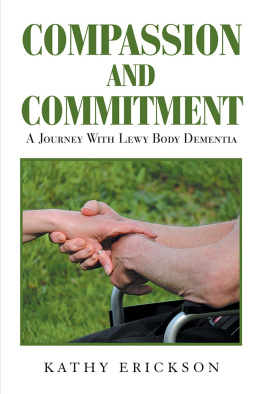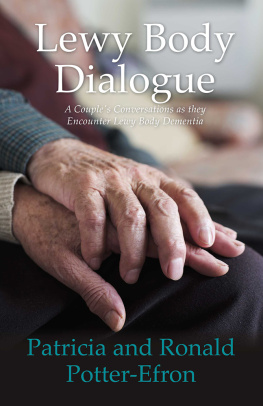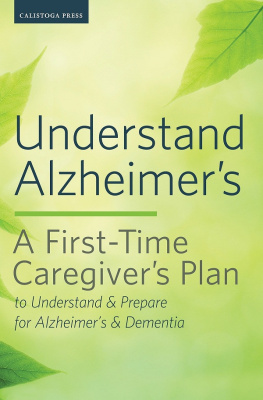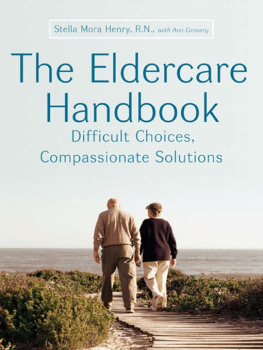Compassion and
Commitment
A JOURNEY WITH LEWY BODY DEMENTIA

Kathy Erickson
Copyright 2019 by Kathy Erickson.
Library of Congress Control Number: 2018914800
ISBN: Hardcover 978-1-9845-7227-1
Softcover 978-1-9845-7226-4
eBook 978-1-9845-7225-7
All rights reserved. No part of this book may be reproduced or transmitted in any form or by any means, electronic or mechanical, including photocopying, recording, or by any information storage and retrieval system, without permission in writing from the copyright owner.
The views expressed in this work are solely those of the author and do not necessarily reflect the views of the publisher, and the publisher hereby disclaims any responsibility for them.
Any people depicted in stock imagery provided by Getty Images are models, and such images are being used for illustrative purposes only.
Certain stock imagery Getty Images.
Rev. date: 12/26/2018
Xlibris
1-888-795-4274
www.Xlibris.com
787457
Contents
To the Lewy Body Dementia Support Group on Facebook.
You have helped me get through these past years with your comments, questions and answers, and venting! I thought I was alone in this fight and you have all proven to me that there are many suffering with this disease. Hopefully this book will help some of you as the support group has helped me.
To my children Doug, Dan, and Amy
You have been such an immense help to me during these last fourteen years. I would not still be here caring for dad without all the support I have received from each one of you.
To my many dear friends
Thank you for your constant prayers and concerns. I truly believe the only way to get through something like this is through prayer. I love you all.
M y husband was diagnosed with early-onset Parkinsons disease in October 2004 when he was 50 years old. I started writing a journal to try and keep track of his symptoms as his disease progressed, what medications we tried and discontinued, and how our daily lives had drastically changed. I also thought it would be like therapy for me, although I never thought Id still be journaling 14 years later! I tried to write every day but was soon overwhelmed with taking care of him, the house, the bills, and the kids, the yard, my parents, (my mom had Alzheimers) all while trying to work full-time. We have three children who are now grown. Our oldest two children are boys, 35 and 32. Our youngest is a girl, 28. The boys both live very close, just down the road, but my daughter lives two hours away. However, I know that I can count on each one of them to help out if I ask for their assistance. Im so very proud of each one of them as they have all grown up to be respectful, smart, funny, and very compassionate people. I would NOT be able to get by with the care of the house and property without my kids help. The boys take care of the outside work, summer, and winter. We have a big house with 40 acres of land. We mow about two acres. My husband and I built our house and moved in back in 1978 after we got married. When we got married, we both took our wedding vows seriously. We knew it would be hard work to have a happy marriage, but we believed it was worth the work. There would be compromising, commitment, and genuine love between us that we could deal with whatever came our way. For better, for worse, for richer or poorer, in sickness and in health, till death do us part.
Here is our story.
J im was working full-time as a letter carrier with the U. S. Postal Service and walked approximately nine miles every day delivering mail on his route. He was a very intelligent and athletic man. He was the salutatorian of his high school class, and after high school, he continued to play sports, mostly softball and basketball. He coached all three kids in whichever sport they played.
Back in 1999 when Jim was 45, he started having severe pain in his hips. After visiting an orthopedic doctor, we found out that Jim needed hip replacement surgery on both hips. He didnt want to have the surgery right away because he was afraid he would miss too much work. He lasted until January 2004 when the pain became intolerable from walking nine miles each day. He decided to have the hip that bothered him the most replaced first. Immediately after the hip replacement surgery, I noticed something wasnt right. While in the hospital room he would sit and stare into space like he was in a trance. He didnt know where he was or that he just had surgery. He was struggling with memory issues, hallucinations, and confusion. He was also experiencing extreme muscle jerking that he had no control over. The nurses said it was common for some people to have issues after receiving anesthesia and he should get better each day.
After Jim got released from the hospital, he went through the normal rehab program then came home to continue physical therapy. I believed the confusion, hallucinations, and mild cognitive impairment he continued to experience were NOT normal, and he never recovered fully after the surgery. He went back to work at the Post Office after a few months but continued to struggle. We both noticed simple things were becoming more difficult. Jim was having increasingly poor hand coordination when buttoning his shirt and going through the letters he was delivering. His handwriting was becoming smaller and smaller, and his voice was becoming quieter. While driving, he struggled to stay in his lane and his reaction time was very slow. It was a short drive for him to get to work and back home, so that is all he drove, except a block or two delivering the mail. I was extremely hesitant about him driving any distance.
Jim was getting worried that something might be wrong, so he made an appointment with a neurologist. At that time we had no idea that all these symptoms were related. It was October 2004 when Jim went to his first appointment. After the initial examination, the neurologist diagnosed Jim with Parkinsons disease. The doctor said he wouldnt be surprised if Jim ended up with a malignant version of Parkinsons in the form of multiple system atrophy. We didnt know what that meant, but we were both in shock! The neurologist prescribed Amantadine and Requip and ordered a series of tests like a CT scan, MRI, an EMG, blood work and a urinalysis. Amantadine is a drug commonly prescribed for people with Parkinsons disease. Its purpose is to help with the sudden uncontrolled movements associated with Parkinsons disease. Requip is prescribed to improve the ability to move and decrease tremors, stiffness, slowness, and also helps with balance.
The test results showed that Jim had mild carpal tunnel syndrome, but the brain scans were all normal as well as the blood work and urine test. At each subsequent doctor visit, I explained how restless Jim was all night, and I couldnt believe that he could have a restful sleep with all the muscle jerking, tugging on his sheets, and screaming all night. It was during his appointment in April 2005 that the doctor prescribed Sinemet and Ambien hoping to help him sleep at night. The neurologist added the Sinemet in hopes that it would aid with Jims difficulty moving while helping with shakiness and stiffness. The doctor was also concerned because Jim had been losing weight over the past six months. Jim informed the doctor that he was extremely tired all day, so the doctor ordered a sleep study to see if Jim had a sleep disorder. I was very happy because now someone besides me would see how bad sleeping was for Jim. During the sleep study, Jim was hooked up to all sorts of electrodes from his head to his toes. I was positive those would track all the times he uncontrollably jerked during the night because sometimes the jerks were substantial. He also screamed during the night like he was having nightmares.
Next page










